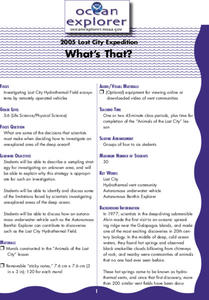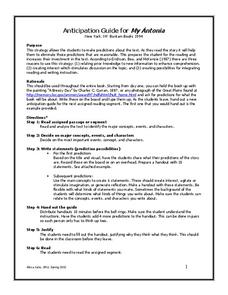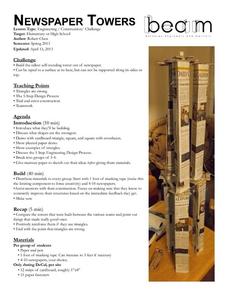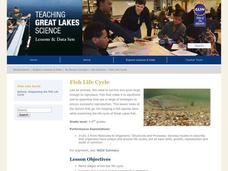Santa Ana Unified School District
Early American Poets
The poems of Walt Whitman and Emily Dickinson are the focus of a unit that asks readers to consider how an artist's life and changes in society influences his or her work. After careful study of Whitman's and Dickinson's perspectives on...
DiscoverE
Product Dissection
Sometimes, taking things apart is more fun than putting things together. Groups of learners participate in a reverse engineering activity. They dissect a device of their choosing to see how it works—great hands-on learning from the...
Science 4 Inquiry
The Impact of the Sun and Moon on Tides
In 150 BC, Seleucus of Seleucia theorized that the moon causes the tides. Scholars learn about what causes tides by studying the interactions of gravity between the sun, moon, and Earth. They use technology to formalize otherwise...
University of California
Principles vs. Practices
Have you ever wondered what your own World Order would look like? Scholars use primary and secondary documents as well as video clips to investigate and analyze the Cold War. Using the sources, the principles and practices of nations...
Kenan Fellows
Unit 1: Introduction to Biotechnology
Biotechnology is big! Introduce the uses of biotechnology to science scholars with a fascinating, fact-filled unit. The first installment in a series of four biotechnology units covers the role biotechnology plays in human and...
Appalachian State University
The Fault in Our Stars: A Movie Study Guide for Eighth Grade Language Arts, Social Studies, and Science
How would you spend your last days with a loved one? The movie guide for The Fault in Our Stars prompts scholars to compare important scenes from the novel to the film and contains background information about the author, guided...
Roy Rosenzweig Center for History and New Media
American Indians and their Environment
People could take a page in ingenuity and survival from the Powhatans. Deer skins became clothes, and the members of the Native American group farmed the rich Virginia soil and hunted in its forests for food. Using images of artifacts...
Anti-Defamation League
Student Dress Codes: What's Fair?
The controversy over school dress codes continues. The debate involves questions like, why is there a policy? Who sets the policy? Who enforces the policy? What is a fair policy? Tweens and teens have an opportunity to engage in the...
Curated OER
What's That?
Meant to be a simulation of a deep-sea exploration, this requires that another activity be completed first. In that activity, titled "Animals of the Lost City," marine biology buffs construct murals of benthic communities. In this...
Curated OER
Massif Mystery
After reviewing plate tectonic theories and the discovery of both the Atlantis Massif and the Lost City hydrothermal vents, earth science learners complete a worksheet and participate in discussions about what the types of rock found...
Curated OER
Shizuko’s Daughter: List-Group-Label Strategy
Help your learners navigate the vocabulary of Shizuko's Daughter by Kyoko Mori with a instructional activity on categorizing words. After coming up with a list of things that grow from the earth, learners decide which categories each...
Curated OER
Guided Reading: Three Little Pigs (Plus Wolf: Javalinas)
Guide your class through reading various versions of The Three Little Pigs. Talk about the traditional story line and then discuss a different point of view: Maybe the wolf was just an innocent bystander! This lesson plan, which has...
BBC
Sorting and Using Materials
First and second graders see that everyday objects are made from a variety of materials. They interact with objects such as keys, plastic spoons, a wooden ruler, a towel, and a plastic bag. A discussion ensues which leads them to...
Curated OER
"Hard Times Come Again No More" : Letters From Arkansas Families in the Great Depression
Through this series of terrific lesson plans, pupils learn about the extent of poverty in the state of Arkansas during the Great Depression. They read documents from the period which describe how hard times were, view an online photo...
Curated OER
Itchy Ritchy
Itchy Ritchy can help your learners remember the /i/ sound! First teach young learners the fun tongue twister illustrating the target sound, and have them identify the target sound in other words. Use the reading Tim and the Top to...
Curated OER
My Antonia: Anticipation Guide
Making predictions is an important skill that experienced readers tap into when tackling a difficult text. Prepare your pupils to read My Antonia by Willa Cather with an initial prediction activity and this anticipation guide, which...
Berkeley Engineering and Mentors
Newspaper Towers
The challenge is quite simple: build a tall tower from a predesignated number of newspaper sheets. Emerging engineers work in teams to build the tallest structure. You will demonstrate some structure shapes and discuss their relative...
Environmental Protection Agency (EPA)
Teachers' Guide to Using A Day In the Life of a Drop
Hydrology hopefuls learn about their local watershed. Through discussion and online interactives, they see that their habits affect the water supply. The lesson concludes with a pledge to filter out bad water usage habits. It makes a...
Michigan Sea Grant
Fish Life Cycle
Fish are no different when it comes to a living being's primary objective—to reproduce. They do differ, including from fish species to fish species, in their life cycles, survival tactics and reproductive strategies. After discussion of...
Other popular searches
- Spring Festival
- Springboard
- Spring Acrostic
- Spring Art
- Spring Time
- Spring Bulletin Board Ideas
- Spring Haiku Poetry
- Spring Art Lesson Plans
- Spring Lesson Plans
- Spring Theme
- Spring Lessons
- Writing Activities Spring




















